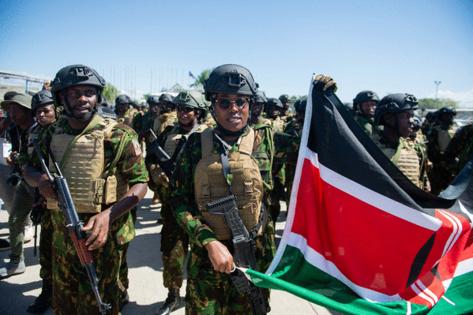Mexico becomes first Latin American country to give to Kenya-led fund for Haiti
Published in News & Features
Mexico has become the first Latin American country to contribute to a United Nations trust fund supporting the Kenyan-led multinational security mission in Haiti, joining Canada and the United States as the only countries in the Western Hemisphere to make a financial contribution.
Mexico announced its contribution to the voluntary fund on Monday as the U.S., Kenya and Haiti led efforts during a high level meeting in New York to get support at the U.N. Security Council to transition the beleaguered Kenya-led mission into a larger “Gang Suppression Force” with a broader mandate. A draft resolution, co-written by the U.S. and Panama, has been running into roadblocks ahead of the expiration of the Kenya mission’s mandate on Oct. 2, U.S. Deputy Secretary of State Christopher Landau said.
“Haiti stands at a crossroads. Port-au-Prince faces an escalating security crisis with gangs terrorizing communities, extorting families and recruiting desperate children to commit horrors on behalf of gang leaders,” he said. “Despite the contributions of Kenya and the countries that have joined the [Multinational Security Mission] though, the mission currently lacks the mandate and the resources necessary to address the mounting scale of the challenge.”
Enrique Ochoa, Mexico’s vice minister for multilateral affairs and human rights, said his nation agrees “on the need to have a mission that is much stronger and that has the necessary financial resources and the necessary equipment in order to face the terrible situation that Haiti is currently experiencing.” He then announced the Mexican government had made a contribution to the trust fund.
Ochoa didn’t announce the amount. But a look at the U.N.-controlled Trust Fund for the MSS shows Mexico making a $100,000 contribution earlier this month soon after France gave its third contribution of $581,050. The total amount the fund now has in hand is $113.2 million, with Canada being the single largest contributor after pledging more than $61 million.
While the total cash in hand at the U.N. is enough to pay for the stipends of the Kenya mission’s 1,000 personnel until the end of the year, the funds are not enough to support the effort to dismantle the high-powered criminal groups terrorizing Haiti and ensure that the personnel have the necessary equipment, supporters of the mission have said.
Important gesture
Mexico’s contribution, while not as large as others, is an important gesture because U.S. Secretary of State Marco Rubio has been pushing for nations, especially countries in Latin American and the Caribbean, to share the financial burden of helping Haiti solve its continuing crisis.
Rubio has also suggested that the leadership of the anti-gang fight should be spearheaded by a country or countries in the Americas region, not necessarily Kenya.
It’s a tall order considering that despite concerns about Haiti’s violence spilling over, Latin America and Caribbean nations have not been responsive. Jamaica and The Bahamas, for example, have yet to make good on their troop-deployment promises, while Belize and Barbados both took a step back.
Guatemala and El Salvador are the only countries in Latin America that have fielded military personnel to the Kenya-led mission. The Dominican Republic, which shares the island of Hispaniola with Haiti, said Monday that it has spent more than $1 million of the $10 million it had committed to the mission on medical care.
“Thus far, we’ve carried out 42 Medevac flights and provided medical assistance in Dominican hospitals, where they have been treated with the same care as if they were Dominican citizens, 38 Kenyan police and 12 personnel from El Salvador who were seriously wounded,” Foreign Minister Roberto Alvarez said.
In 2017, Mexico became the first country to help Haiti with reviving its once-disbanded army by agreeing to train Haitian soldiers despite objections from Washington, which still doesn’t recognize the Armed Forces of Haiti. Last year, France also started providing military training, and Colombia has since committed to do the same.
Training the Haitian army
In all, 912 members of Haiti’s Armed Forces have been trained by the Mexican army, including 250 who were trained in Port-au-Prince and 143 who returned this past weekend to the capital after spending eight weeks in Mexico learning about self-defense, weapons and human rights.
The financial and in-kind contributions come as the U.N. Security Council continues to wrestle with the fate of the armed international assistance force in Haiti, and as the country struggles to attract the international community’s financial support and attention to its deepening crisis.
“The people of Haiti... are members of the human race like us, and they deserve as much, not less,” Kenyan President William Ruto said Monday as he hosted the high level U.N. meeting on Haiti. The meeting took place at the start of this week’s General Assembly, in which Ruto and other world leaders are marking the 80th anniversary of the global organization against a backdrop of crises and funding cuts.
Armed attacks by gangs have led to the deaths of more than 3,000 Haitians this year. The U.N.’s humanitarian office noted that recent attacks in rural communities in the Artibonite and Northwest regions have also added to the numbers of people who have had to flee their homes, already at a record 1.3 million-plus. Despite the worsening situation, the country’s humanitarian crisis remains one of the least funded globally.
“It’s true that there are conflicts in other parts of the world, but we, I believe, are facing a level of Haiti fatigue that we have to break,” Barbados Prime Minister Mia Mottley said as she sounded the alarm over the “horrific” human suffering.
©2025 Miami Herald. Visit at miamiherald.com. Distributed by Tribune Content Agency, LLC.







Comments